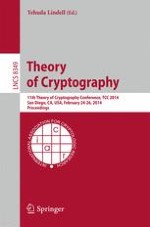2014 | OriginalPaper | Buchkapitel
Non-malleable Coding against Bit-Wise and Split-State Tampering
verfasst von : Mahdi Cheraghchi, Venkatesan Guruswami
Erschienen in: Theory of Cryptography
Verlag: Springer Berlin Heidelberg
Aktivieren Sie unsere intelligente Suche, um passende Fachinhalte oder Patente zu finden.
Wählen Sie Textabschnitte aus um mit Künstlicher Intelligenz passenden Patente zu finden. powered by
Markieren Sie Textabschnitte, um KI-gestützt weitere passende Inhalte zu finden. powered by
Non-malleable coding, introduced by Dziembowski, Pietrzak and Wichs (ICS 2010), aims for protecting the integrity of information against tampering attacks in situations where error-detection is impossible. Intuitively, information encoded by a non-malleable code either decodes to the original message or, in presence of any tampering, to an unrelated message. Non-malleable coding is possible against any class of adversaries of bounded size. In particular, Dziembowski et al. show that such codes exist and may achieve positive rates for any class of tampering functions of size at most
$2^{2^{\alpha n}}$
, for any constant
α
∈ [0, 1). However, this result is existential and has thus attracted a great deal of subsequent research on explicit constructions of non-malleable codes against natural classes of adversaries.
In this work, we consider constructions of coding schemes against two well-studied classes of tampering functions; namely, bit-wise tampering functions (where the adversary tampers each bit of the encoding independently) and the much more general class of split-state adversaries (where two independent adversaries arbitrarily tamper each half of the encoded sequence). We obtain the following results for these models.
1
For bit-tampering adversaries, we obtain explicit and efficiently encodable and decodable non-malleable codes of length
n
achieving rate 1 −
o
(1) and error (also known as “exact security”)
$\exp(-\tilde{\Omega}(n^{1/7}))$
. Alternatively, it is possible to improve the error to
$\exp(-\tilde{\Omega}(n))$
at the cost of making the construction Monte Carlo with success probability
$1-\exp(-\Omega(n))$
(while still allowing a compact description of the code). Previously, the best known construction of bit-tampering coding schemes was due to Dziembowski et al. (ICS 2010), which is a Monte Carlo construction achieving rate close to .1887.
2
We initiate the study of
seedless non-malleable extractors
as a natural variation of the notion of non-malleable extractors introduced by Dodis and Wichs (STOC 2009). We show that construction of non-malleable codes for the split-state model reduces to construction of non-malleable two-source extractors. We prove a general result on existence of seedless non-malleable extractors, which implies that codes obtained from our reduction can achieve rates arbitrarily close to 1/5 and exponentially small error. In a separate recent work, the authors show that the optimal rate in this model is 1/2. Currently, the best known explicit construction of split-state coding schemes is due to Aggarwal, Dodis and Lovett (ECCC TR13-081) which only achieves vanishing (polynomially small) rate.
